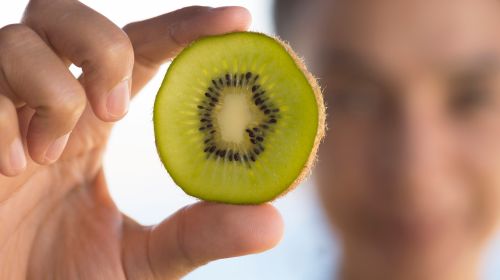Vitamin C is a vital vitamin that the body needs through diet. If there is a deficiency, the immune system in particular suffers, and depression is also favored. In order to meet your needs, it is important to include foods rich in vitamin C in your daily diet.
- Citrus fruits are good sources of vitamin C. But there are even better ones: kale and other types of cabbage, just like paprika or sea buckthorn.
- © iStock.com/ArthurHidden
In contrast to some animals, which can produce vitamin C (ascorbic acid) themselves, humans are dependent on constant intake with their food. Vitamin C is soluble in water, which limits its storage capacity in the body. So there has to be constant replenishment through nutrition.
At a glance:
A lack of vitamin C can lead to depression
A vitamin C deficiency can manifest itself through tiredness, depression, hysteria, lethargy, poor performance, increased susceptibility to infections, delayed recovery after illnesses and wound healing disorders. For the classic vitamin deficiency disease scurvy, which hardly ever occurs in industrialized countries, fatigue, lack of drive, anemia, wound healing disorders, gingivitis, falling teeth, nosebleeds and bruises are typical.
-

Vitamin C prevents tiredness, poor performance and depressive moods. Are you getting enough of it?
to the test
A vitamin C deficiency is usually caused by an inadequate supply. In some people, a vitamin C deficiency is also favored by an increased need for the vital vitamin. For example, smokers have an increased need because cigarettes produce free radicals.
What is the daily requirement for vitamin C?
The German Nutrition Society (DGE) recommends a certain intake of vitamin C for different age groups to easily cover the daily requirement. Men have a slightly higher need, as do pregnant women and especially women who breastfeed.
It is advisable to distribute the ration in small portions throughout the day, as it is then better absorbed (absorbed in the intestine).
| Age | Daily requirement male (in milligrams) | Daily requirement female (in milligrams) |
| 0 to 4 years | 20th | 20th |
| 4 to 7 years | 30th | 30th |
| 7 to 10 years | 45 | 45 |
| 10 to 13 years | 65 | 65 |
| 13 to 15 years | 85 | 85 |
| 15 to 19 years | 105 | 90 |
| 19 to 25 years | 110 | 95 |
| 25 to 51 years | 110 | 95 |
| 51 to 65 years | 110 | 95 |
| 65 years and older | 110 | 95 |
| Pregnant women from the 4th month | 105 | |
| Breastfeeding | 125 |
Table: Foods containing vitamin C (fruit and vegetables)
Lemons and citrus fruits are generally considered to be particularly good sources of vitamin C. However, sea buckthorn, black currants and kale provide far more ascorbic acid. Spinach, savoy cabbage, kohlrabi and paprika are also vegetables that are particularly rich in vitamin C.
The table lists fruits and vegetables that cover more than 40 percent of the daily requirement of vitamin C per serving:
| Food | Serving size in grams | Vitamin C content per serving in milligrams |
| vegetables | ||
| Red cabbage, raw | 100 | 50 |
| Savoy cabbage, raw | 100 | 50 |
| Spinach, raw | 100 | 51 |
| Kohlrabi, raw | 100 | 63 |
| Cauliflower, raw | 100 | 69 |
| Brussels sprouts, cooked | 100 | 87 |
| Broccoli, cooked | 100 | 90 |
| Fennel, raw | 100 | 93 |
| Kale, raw | 100 | 105 |
| Paprika, raw | 100 | 140 |
| Peppers, steamed | 100 | 105 |
| Sauerkraut, raw (drained) | 200 | 40 |
| Fruit and fruit juices | ||
| Grapefruit juice | 100 | 40 |
| Grapefruit | 100 | 44 |
| orange juice | 100 | 42 |
| orange | 100 | 50 |
| kiwi | 100 | 46 |
| Black currants | 100 | 177 |
| Sea buckthorn berry juice | 100 | 266 |
| pineapple | 200 | 40 |
| Raspberries | 200 | 50 |
| Strawberries | 200 | 124 |
| Honeydew melon | 200 | 64 |
| Mandarins | 200 | 64 |
| mango | 200 | 74 |
Foods containing vitamin C usually cover the daily requirement
A pronounced deficiency in vitamin C is extremely rare because ascorbic acid is found in so many common foods. However, those who have an increased need and / or only eat very few foods containing vitamin C sometimes do not cover their daily requirement through diet alone. Then the first thing you should think about is a diet rich in vitamin C.
Caution: In order to cover the need for vitamin C through natural food intake, vegetables rich in vitamin C should not be cooked for too long, as this significantly reduces the vitamin C content.
Another possibility are dietary supplements with vitamin C, for example in the form of tablets. However, healthy people who have a balanced diet rarely need such preparations.
Overdosing with vitamin C tablets?
Those who take supplements containing vitamin C in addition to their normal diet need not fear an overdose. This is because, unlike non-water-soluble vitamins (E, D, K and A), the body does not store water-soluble ascorbic acid, but instead excretes it again unused via the kidneys with the urine when it is increased.
Please note: Anyone who thinks they are suffering from a vitamin C deficiency can contact their doctor. Especially people with metabolic diseases should not take vitamin C tablets and other food supplements on their own, but should clarify the measure beforehand with a doctor. People who are prone to kidney stones or who have sensitive intestines should also avoid vitamin C tablets if possible.
Functions of vitamin C (ascorbic acid) in the body
Vitamin C takes on numerous tasks in the human body and also helps to prevent certain diseases. The most important tasks of vitamin C at a glance:
Vitamin C activates and regulates the metabolism.
Ascorbic acid is the nutritional vitamin for the body's supporting tissues: connective tissue, cartilage, bones and teeth need it for growth and regeneration.
Vitamin C also activates killer and phagocytes that render pathogens harmless. This has given ascorbic acid its reputation as an immune system booster against colds and other infections.
In addition, vitamin C is involved in the breakdown of drugs and other substances in the liver.
Vitamin C protects cells and tissues from free radicals and numerous other vitamins from being destroyed by oxygen.
In addition, ascorbic acid promotes iron absorption and utilization.
Vitamin C also prevents LDL oxidation. LDL is what is known as bad cholesterol. Oxidized LDL is aggressive, it damages the vascular wall and eventually deposits. Vitamin C prevents this and thus prevents hardening of the arteries and heart disease.


